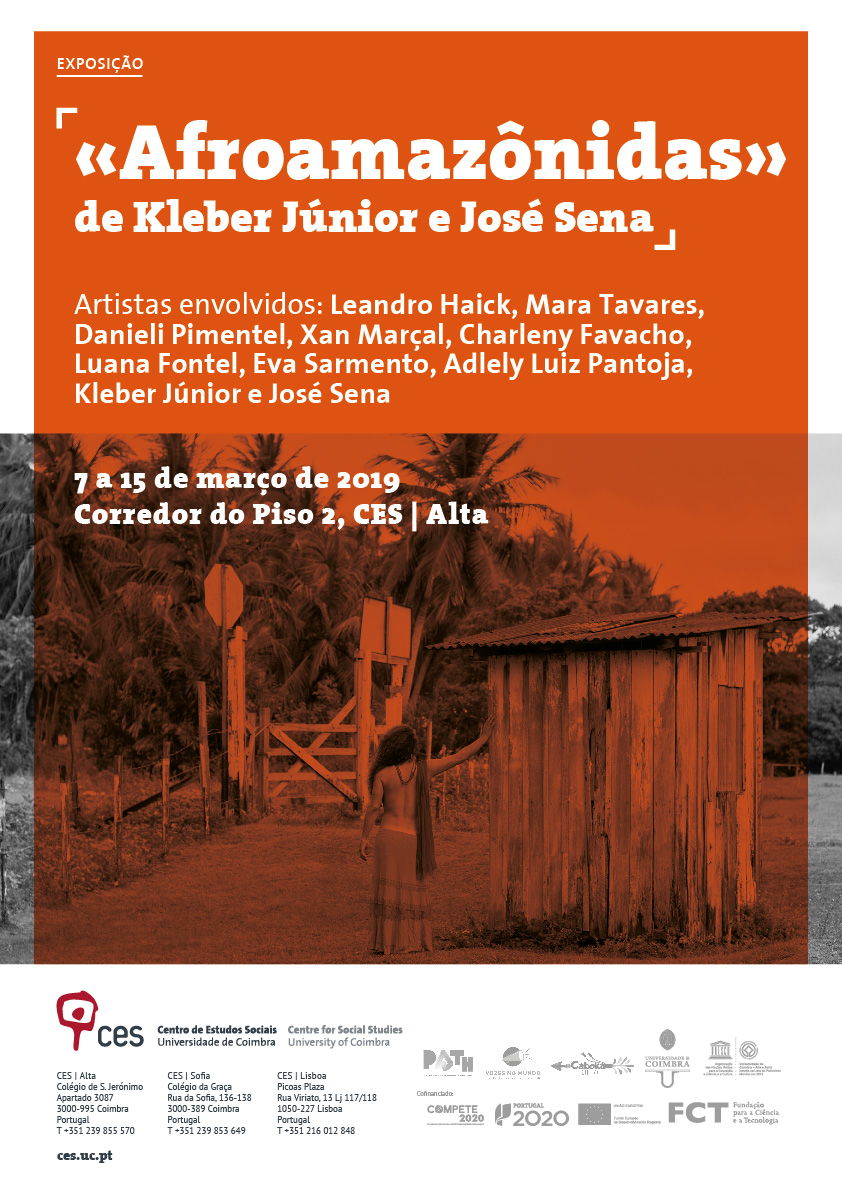Exhibition
«Afroamazônidas» by Kleber Júnior and José Sena
March 7 to 15, 2019
2nd Floor Hallway, CES | Alta
About
Afroamazônidas is a photo-performance production resulting from the work of LGBT/Queer activist photographer Kleber Júnior and LGBT/Queer activist José Sena. Kleber had been developing photographic work since 2014, focusing primarily on images and self-narratives expressed in his self-portrait. From this initiative, he began to photograph other people, always seeking to unite the aesthetic to the mood of the subjects he was photographing, creating, with this, images and narratives around the lives of the people photographed. In 2018, as a result of an offer to the Amazonian "Afroindigenous" entities, José Sena becomes the subject of Kleber's work, producing, together with the photographer, images and narratives that express him as LGBT/Queer body/life and macumbeiro. Equally LGBT/Queer and Umbandist, Eva also gathers her references in a photoperformance essay.
The crossroads generated by the work brought into debate issues of gender, sexuality, race and religiosity. In addition to the images and narratives traditionally linked to these categories (heteronomativity and compulsory cisgeneration, raciality and worship of the gods/Orixás of African and "indigenous" matrix), photoperformance production stimulates the deletion and blending of these "indigenous", African, gender/sexualities, which potentiates a contemporaneously reflexive exercise on these queer bodies and lives.
Between the woods, mangrove, seas and rivers of the Marajoara archipelago, José and Eva thank, pray and dance to entities, in a movement that recovers references from Afro-Brazilian matrixes while at the same time erasing their limits and letting them see the transits between the masculine and the feminine, in an existential post-colonial, de-colonial, counter-colonial exercise. Embedded in a Queer (PEREZ-NAVARRO, 2018) and experimental way to make art interventions (SENA, 2013, 2016), the photo-performance exposition claims, existing, its legitimacy in a territory historically marked by erasure, via genocide and LGBTophobia.
Artists involved: Leandro Haick, Mara Tavares, Danieli Pimentel, Xan Marçal, Charleny Favacho, Luana Fontel, Eva Sarmento, Adlely Luiz Pantoja, Kleber Júnior e José Sena.
Resistance to Genocide and LGBTophobia!
According to Decree No.30.822 of May 6,1952, which promulgates "the Convention for the Prevention and Suppression of the Crime of Genocide, concluded in Paris on December 11, 1948, at the Third Session of the General Assembly of the United Nations", genocide concerns "acts committed with intent to destroy in whole or in part, a national, ethnic, racial or religious group" [1].
The attempt to erase the original peoples of what is now called Brazil portrays the genocide implanted by colonialism until the present day (HECK et al., 2005; GOIZ, 2016), a perverse performance that can only be overcome by those who know how to dialogue with death: "From the perspective of ancestrality there is only death when there is forgetfulness and to the perspective of enchantment both death and life are transgressed into a condition of survival" (SIMAS, RUFINO, 2018, p.11).
Recognising the persistent existence of genocide in face of African-Brazilian bodies and religions (CAMPOS, 2017), and in view of the fact that Brazil is one of the countries that most kills LGBTI+ (BRAZIL, 2018), the exhibition maintains the pact with the Afro-Amazonian ancestry, as well as the demands of the gender/sexualities that mark LGBT/Queer bodies and lives.
In addition to the actions of the Platform for Anti-Transphobia and Homophobia (PATH), which articulates an annual agenda for the Queer cause in Coimbra, the photo-performance exhibition also joins the political actions of the collective Vozes no Mundo pela democracia, movements that solidify and enlarge our bodies in resisting religious intolerance, racism and LGBTophobia established in Brazil and in the contemporary world.
Objective
To mobilize a space for reflection within the framework of discussions about gender/sexuality, race, spirituality/religiosity and ancestry based on a photo-performance exposition which erodes hegemonic matrices when enunciating narratives and images of LGBT/Queer bodies, beliefs and lives.
Support and funding
PATH - Anti-Transphobia and Homophobia Platform (Coimbra/PT), Centre for Social Studies of the University of Coimbra (CES/UC), Vozes no Mundo: frente pela democracia no Brasil and Collective KABOCA


